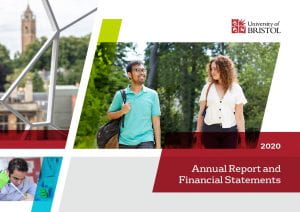 This week we’ve published our Annual Report and Financial Statements for 2019/20. It showcases just some of the outstanding work that colleagues and students have undertaken over the last year in very challenging circumstances. The contributions of our community in helping society respond to the COVID-19 pandemic at both local and global levels are truly impressive. It also sets out our financial performance for the last academic and financial year and provides a snapshot of our financial position as it was on 31 July 2020.
This week we’ve published our Annual Report and Financial Statements for 2019/20. It showcases just some of the outstanding work that colleagues and students have undertaken over the last year in very challenging circumstances. The contributions of our community in helping society respond to the COVID-19 pandemic at both local and global levels are truly impressive. It also sets out our financial performance for the last academic and financial year and provides a snapshot of our financial position as it was on 31 July 2020.
Research
Our research activity was the key area impacted by the first national lockdown, between March and July 2020. Many colleagues were unable to access facilities and undertake the interactions that were needed to progress their projects. Activity was 7% lower than the previous year: a change from the sustained year-on-year growth in research activity in recent years.
This temporary setback was necessary at the time to manage the risk that COVID-19 posed across the wider community. We have subsequently learnt more about COVID-19 as a society. Government policy, based on this evolving understanding of the virus, reflects the view that the risk to ongoing research activity is now lower than previously anticipated.
Education and longer-term uncertainties
Despite the difficulties we’ve faced, learning activity has remained extremely resilient. This is not completely unexpected, for two reasons.
Firstly, the initial national lockdown occurred at a point where students were invested in completing the academic year, with a relatively low proportion of tuition still to take place across most of our programmes. Our student withdrawal rate in Term 3 of academic year 2019/20 was lower than in recent years, despite the lockdown.
Secondly, opportunities for school leavers and graduates to obtain work or travel are reduced at present. Universities are typically counter-cyclical to the general economy, and we are seeing greater demand from prospective students. That demand is often accompanied by increased investment from government to build the research, innovation and infrastructure economies needed to help sustain the country in the short term and position it well for the medium term.
Our student population grew by 7% during 2019/20. We expect similar levels of growth over the course of the current 2020/21 academic year, although it is still too soon to make accurate forecasts – we are still building our evidence base to understand how students are responding to blended learning, and some 4,500 students elected to start the academic year online. However, around 2,000 students have told us they are intending to travel to Bristol for the first time for Teaching Block 2.
We are left, then, with several important questions. Primarily, will student withdrawal rates be greater, less or about the same as usual? And what will the impact of vaccinations be? In response to these uncertainties, we need to continue to proceed with caution until the risks of student withdrawal are better understood, with the picture expected to become clearer in the new year.
What we do know is that demand for our other services, including residential accommodation, sport and catering, is down. This is the principal reason for a £23-million decline in ‘Other Income’ year-on-year between 2018/19 and 2019/20. We expect the decline to be sustained throughout most of the present year.
Residential income losses are expected to reach at least £25 million from the onset of the pandemic to the end of this academic year. This sum could be considerably greater if a higher proportion of learning activity were to move online. We therefore need to maintain adequate financial headroom to manage all of these uncertainties without adversely impacting our staff and academic endeavour.
Jobs and recruitment
Protecting jobs has been, and will continue to be, a key objective. We furloughed close to 900 colleagues over the summer period. Virtually all have now returned to work given the very significant institutional workload. Our temporary worker bank is also being fully utilised. However, we will continue to furlough permanent, fixed-term and temporary staff to protect their incomes as best we can, where it is not possible for their work to continue as a direct consequence of COVID-19.
Our investment in people has been significant. Our colleague base grew by 396 (6%) full-time equivalents over 2019/20. Investment in existing and new staff (excluding non-cash pension accounting) increased by £30 million. We have not stopped recruiting at any point. However, we’ve had to be really careful to make sure that we have only been recruiting the roles we require at the present time. This has helped us maintain the necessary financial headroom to manage the ongoing pandemic and reduce the risk of future job losses.
In prioritising recruitment and job protection, against the backdrop of falling residential, sport and catering income, we have been obliged to pause several planned capital projects. Our staff and students are the University’s top priority and our cash position remains healthy. This is critical to our collective future.
The 2019/20 surplus
So why, despite reporting a surplus for 2019/20 of £81.8 million, have we still been very careful with our resources? The answer lies in the accounting treatment for the deficit in the USS pension scheme and capital grants received during the year.
We are required to reflect the future value of payments due to be made over the coming years to USS to fund the actuarial assessed deficit in the scheme. This helps ensure that the future value of assets in USS are sufficient to pay the pension benefits earned. We had to recognise a very significant expense of £105.9 million in the 2018/19 accounts following the 2017 valuation of USS, leading to an overall reported deficit of £67.7 million. A subsequent valuation was undertaken in 2018 to respond to some of the recommendations of the Joint Expert Panel. This resulted in a reduction in the USS deficit and consequently the level of deficit recovery payments the University is contracted to make.
We have had to reflect this change in the 2019/20 accounts by reversing £63.6 million of the expense charged in the previous year in our income and expenditure statement. This is responsible for the majority of the £81.8-million surplus, alongside £26.7 million of capital grants (income received to pay for new assets where the expense is recorded initially on the Statement of Financial Position and not as operating expenditure). This leaves an underlying deficit for 2019/20 of £8.8 million, which was funded out of reserves.
Looking ahead
The lead indicators for our institution such as research grant awards and student applications look very promising for the future. Our Board of Trustees this month approved a plan to invest more in people and research in the New Year, if and when the present risks relating to student participation in on-campus learning recede.
In the meantime, we need to keep proceeding with care over the next few months as the government rolls out its Winter Plan for managing COVID-19.
It has been a very difficult year for our community, but your collective efforts have helped steer the University though what I’m sure we all hope has been the worst of the storm. As normality slowly returns, we will continue to invest in our academic endeavour, our Professional Services, and the future facilities we need to restore our place among the world’s top 50 institutions.


 This is the first in a new series of regular updates, setting out how the University is addressing the challenges of COVID-19 and keeping our students, staff and neighbouring communities safe.
This is the first in a new series of regular updates, setting out how the University is addressing the challenges of COVID-19 and keeping our students, staff and neighbouring communities safe.